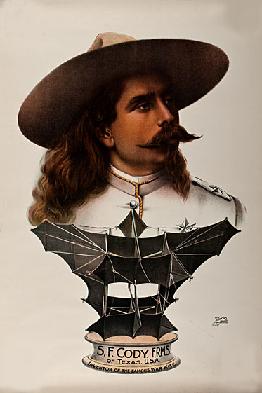

| Home Links Contact |
| 1887-88 1891-92 1892 1902-03 1904 |
|
|
For many years thereafter, ‘Colonel’ S. F. Cody haunted the British theatrical circuit with a succession of Western dramas, most notably The Western Nugget, a blood and thunder affair, which included rifle and revolver shooting, spectacular stunts, and even specially trained horses on stage. From around the turn of the 20th century, however, his focus began to shift, as, in tandem with his theatrical activities, he began to experiment with huge man-carrying kites, considered, for a time, as possessing viable military applications. In 1905, he abruptly abandoned his stage career when he was assumed as a civilian employee of the British Army. In this capacity, he graduated to the Nulli Secundus, an airship similar in concept to the Zeppelin, finally turning his not inconsiderable talents to bona fide aeroplanes.

Any conscientious researcher into Buffalo Bill’s British venues must inevitably run into puzzling reports that he returned to these shores c. 1910, on this occasion bringing a sort of flying circus with him; or, stranger still, that he was killed in a ‘plane crash over Cove Common near Aldershot on 7th 1913, contradicting the documented fact that Col. W. F. Cody died in bed at his sister’s home in Denver, Colorado, on 10th January 1917. This particular Buffalo Bill alter ego was born Franklin Samuel Cowdery, at Davenport, Iowa, in 1867. He began his working life as a cowboy, working the cattle trails from Texas to Montana. A brief and spectacularly unsuccessful sojourn as a gold prospector in Alaska followed, from the summer of 1883 until the spring of 1884. Next came a brief return to the Western plains but the rapid demise of the open range, combined with the particularly severe winters of the mid 1880s, led to the near collapse of the cattle industry. The cowboys were deserting for the Wild West shows in their droves, and Frank, succumbing to the same gravitational pull as his adopted namesake, joined Adam D. Forepaugh’s outfit as a trick marksman and bucking bronco rider.
Frank and his first wife, Maud, arrived in England in 1890, finding employment as a trick-shooting double act in a show devised by English impresario Albert Newton Ridgeley. He sought almost obsessively to counterfeit a family connection to the more famous Cody - Frank was Buffalo Bill’s nephew, his cousin, his brother, at times he was the great showman himself - modifying his name and modelling his appearance accordingly. There was even a court case in 1891, in which an injunction was sought, intended to restrain him from passing himself off as Buffalo Bill’s son. Much serious and lasting confusion was generated in consequence and there are multiple contemporary instances of his more conspicuous deeds being wrongly ascribed to Buffalo Bill.
On 16th October 1908, he became the first man to achieve powered flight over Great Britain, utilising a machine of his own design and construction. In 1909, he was naturalised as a British subject. He appeared in air shows and in 1911 completed the ‘Circuit of Great Britain’ air race, sponsored by Lord Northcliffe, proprietor of the Daily Mail. An extraordinary career trajectory reached its zenith in 1912, when he was awarded first prize in military trials held on Salisbury Plain, but was brought to a tragic and premature close the following year, when he was killed in a flying accident which has never been satisfactorily explained. He was buried with full military honours four days later, in the Military Cemetery at Thorn Hill, Hampshire.
Flamboyant, eccentric, ‘the other Cody’ personified that unique historical intersection in which the pioneering spirit veered its attentions from territorial conquest to technological innovation. However farcical, risible and mendacious the early phases of his career might seem, it is impossible to deny him the status of a first-rank historical figure in his own right, to which his peerless exploits surely elevate him. The crowning irony is that he is chiefly recalled today, when remembered at all, as an obscure and perplexing footnote to someone else’s legend.